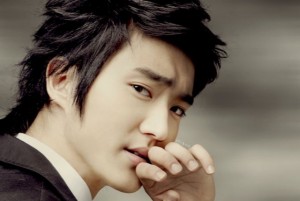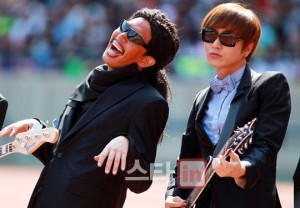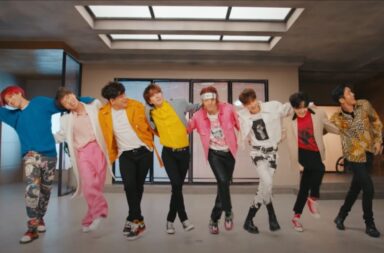 To the K-pop initiate, fascination with South Korean Pop and fascination with South Korean culture often quickly become one and the same. After all, this is the intent of Hallyu Wave, is it not? To export South Korean culture, and by extension South Korea itself, in a safe, shiny, neatly-wrapped package. As a result of this, controversy can often arise within the international community when international fans encounter cultural differences hidden inside of that package of exported pop music that rub them the wrong way. The Western community in particular can cause a lot of grief when running headlong into cultural differences, as evidenced by relatively recent controversies over SNL Korea’s blackface incident and Choi Siwon‘s homophobic comments.
To the K-pop initiate, fascination with South Korean Pop and fascination with South Korean culture often quickly become one and the same. After all, this is the intent of Hallyu Wave, is it not? To export South Korean culture, and by extension South Korea itself, in a safe, shiny, neatly-wrapped package. As a result of this, controversy can often arise within the international community when international fans encounter cultural differences hidden inside of that package of exported pop music that rub them the wrong way. The Western community in particular can cause a lot of grief when running headlong into cultural differences, as evidenced by relatively recent controversies over SNL Korea’s blackface incident and Choi Siwon‘s homophobic comments.
It’s a given that racism and homophobia are both issues that don’t have the same history and cultural context in South Korea that they would in Europe or the Americas. Therefore, whenever these issues crop up in the media, international K-pop fans tend to have understandably confused and impassioned reactions. These reactions are more often than not negative, and critical of South Korean society. The homophobia discussion sparked a great deal of analysis concerning South Korea’s traditionally Confucian ideology, and the blackface incident brought on a lot of criticism with regards to Korean insensitivy toward race issues and ethnocentrism. From a strictly Western perspective on multiculturalism and sexuality, South Korea lags behind in both the media and political world.
 The fact that South Korea has not yet translated into reality the idealized liberal muliticultural democracy should be no surprise to anyone. After all, the Korean War armistice was signed a scant fifty-eight years ago. In those fifty-eight years, South Korea has adopted a multiparty political system, rebuilt a nation from the ruins of war, and performed an astonishing economic leap, transforming from a third-world country to one of the most developed and technologically advanced countries in the world. In short, the nation went through the sort of change in little over half a decade that other nations take centuries to undergo. Even those countries that have toiled for centuries to build a functioning democracy have a long, long way to go.
The fact that South Korea has not yet translated into reality the idealized liberal muliticultural democracy should be no surprise to anyone. After all, the Korean War armistice was signed a scant fifty-eight years ago. In those fifty-eight years, South Korea has adopted a multiparty political system, rebuilt a nation from the ruins of war, and performed an astonishing economic leap, transforming from a third-world country to one of the most developed and technologically advanced countries in the world. In short, the nation went through the sort of change in little over half a decade that other nations take centuries to undergo. Even those countries that have toiled for centuries to build a functioning democracy have a long, long way to go.
This forms the basis for those arguing against bringing Western viewpoints into South Korean pop and media affairs: it’s hypocrisy and a form of ethnocentrism in itself. Judging Korean media by Western standards is unfair, not only because South Korean has had far less time to adapt to new standards, but Western society itself fails at all the things that it attempts to criticize South Korea for: namely, the aforementioned homophobia and racism issues. This assertion isn’t wrong in and of itself. Heaven knows that most Western countries have never been havens of tolerance for the LGBT community, and there are laws in place that discriminate against the LGBT community. It’s also common knowledge that racism always has been, and probably for some time to come will continue to be a hot button issue. Western media has not yet mastered the art of filmmaking and television without some form of discrimination, offense, or prejudice. Western institutions themselves are often rife with racism and prejudice kept just under the lid.
However, all of that should be no reason to discount legitimate criticisms concerning treatment of the LGBT community and racial awareness in South Korea. Just because Western countries may be hypocrites in regards to these issues doesn’t necessarily mean that they are wrong, and just because Western society itself is rife with prejudice does not mean that prejudice in South Korean society should not be pointed out. The beautiful thing about the Information Age and the advent of the internet is the interconnectedness. The global community is now more than ever able to interact and to exchange philosphies and opinions. The upshot of this is that people can learn from each other, and obtain perspective on both themselves and long-held views that they would not have otherwise. More perspective means more information to draw from, and more information to draw from can feed both personal and societal growth. This works both ways. Reasoned discourse would feed growth within both the K-pop world and the Western consumers. After all, no small amount of Western fans have come to reevaluate their views concerning standards of masculinity and image consciousness post-exposure to K-pop.
In short, the lesson to be learned here is that one should keep an eye on your own prejudices, but don’t turn a blind eye to injustices outside of your home sphere as well. Yes, the West has a long way to go as far as ideological diversification goes. But so does the East, and informed discussion never hurts, even if it starts in a place as seemingly shallow as K-pop.
(BBC, Yahoo! Korea)


